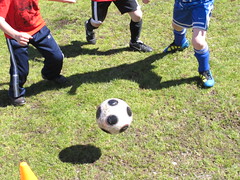 Making the choice about which length of camp is right for your child is downright easy, especially when it comes to the to the full season camps. For those children who wish to be at camp for the seven weeks, a full-season camp experience can be an extraordinary time in their lives.
Making the choice about which length of camp is right for your child is downright easy, especially when it comes to the to the full season camps. For those children who wish to be at camp for the seven weeks, a full-season camp experience can be an extraordinary time in their lives.
So, how do you know if a full season camp experience right for your child?
Remember our discussion of “Is Your Child Ready for Camp?” If you can answer a confident “yes” to all of the questions about readiness, then a full season camp may be perfect for your child.
As a 7 week camp, Camp Laurel provides ideal opportunities for children to:
1) develop relationships and bonds with other campers and counselors with whom they are living,
2) explore new activities which they have never done,
3) refine and develop skills and focus so that by the end of camp they are, as an example, not just getting up on water skis…but skiing barefoot; not just hitting a baseball… but mastering the sport; not just participating in a one-act play for 20 minutes….but being part of the cast of a full length musical.

Children who go to Camp Laurel return to school refreshed and ready to tackle the new year ahead. They have achieved great success at camp – not only in making great friends – but also in developing and refining skills during the summer that can last a lifetime. Many children who wish to make their middle, JV or high school teams can practice and refine those skills all summer long. They also create beautiful and meaningful pieces of art and have greater outdoor educational experiences during their time at camp. All because they have time and opportunity.
PBS’s camp expert, Bob Ditter, M.Ed., puts it this way:
Camp is about making some of the best friends of your life. It’s an exercise in self-reliance and social learning. Kids not only make some of their best friends at camp, they learn what real friendship is. Since campers live in groups, it is also about learning the give-and-take of making decisions and getting along with all those “brothers” or “sisters” you suddenly inherit when you arrive. In a time when resilience–the ability to stick with something and recover from a setback–is a great quality to cultivate in our children, camp is an increasingly attractive option.
Olivia, Guest Blogger

(Photos: Thanks to eyeliam and zappowbang for the great shots.)



